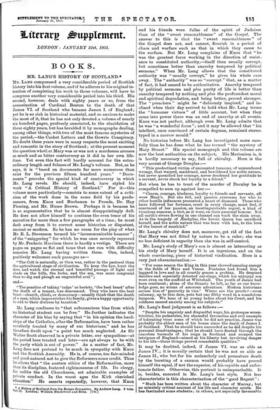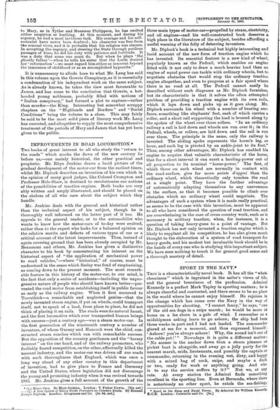BOOKS.
MR. LANG'S HISTORY OF SCOTLAND.*
ME. LANG compressed a very considerable period of Scottish history into his first volume, and if he adheres to his original in- tention of completing his work in three volumes, will have to compress another very considerable period into his third. His second, however, deals with eighty years or so, from the assassination of Cardinal Beaton to the death of that James VI. of Scotland who became James I. of England ; yet he is so rich in historical material, and so anxious to make
the Most of it, that he has not only devoted a volume of nearly six hundred pages, profusely annotated, to the elucidation of these eighty years, but has heralded it by monographs dealing, among other things, with two of the most famous mysteries of the period,—the Casket Letters and the Gowrie Conspiracy. No doubt these years were in many respects the most exciting and romantic in the story of Scotland ; at the present moment the question whether Mary was or was not a murderess arouses as much and as bitter controversy as it did in her own life- time. Yet even this fact will hardly account for the extra- ordinary length length and fulness of Mr. Lang's volume. But, as he says, it is "based on documents far more numerous than exist for the previous fifteen hundred years." " Docu- ments " provoke the special kind of controversy in which Mr. Lang revels. He should, indeed, have styled his work "A Critical History of Scotland." For it—this volume more particularly—consists to some extent of a criti- cism of the work done in the same field by his prede- cessors, from Knox and Buchanan to Froude, Dr. Hay Fleming, and Mr. Hume Brown. Perhaps it is because he is so argumentative that he is almost disappointingly dull.
He does not allow himself to continue the even tenor of his narrative for more than a few paragraphs at a time; he must dash away from it to correct some historian or disputant, ancient or modern. So he has no room for the play of what Mr. R. L. Stevenson termed his "incommunicable humour " ; of the "sniggering" for which he was once severely reproved by Mr. Frederic Harrison there is hardly a vestige. There are pages on pages so flat and tame that one can with difficulty conceive Mr. Lang having written them. One, indeed, positively welcomes such passages as— "The Celt is naturally, or then was, rather in the pastoral than the agricultural stage of civilisation. To keep the kye, hunt the deer, and watch the eternal and beautiful passage of light and shade on the bill% the lochs, and the sea, was more congenial than to dig and plough an ungrateful soul"; and—
"The practice of taking 'calps' or heriots, 'the best beast' after the death of a tenant, was denounced: They who have the best beast—church, chiefs, or democracy—usually think that the death of a man, which impoverishes his family, gives a happy opportunity to add to their distress by taxation."
Mr. Lang confesses to "that subconscious bias from which no historical student can be free." He further indicates the character of his bias by saying that "in his opinion the hard- ships of the Catholics, after the Reformation, have been rather cavalierly treated by many of our historians," and he has thelefore dwelt upon "a point too much neglected. As Sir Walter Scott observed in a private letter, our sympathies—at the period here treated and later—are apt always to be with the party which is out of power." As a matter of fact, Mr. Lang does not pretend to be much in sympathy with Knox and the Scottish Assembly. He is, of course, too fair-minded and good-natured not to give the Reformers some credit. Thus be allows that " the austere ethics of the Reformation, more than its discipline, fostered righteousness of life. Its clergy, far unlike the old Churchmen, set admirable examples of Private conduct. In the worst ages the Kirk cherished education." He asserts repeatedly, however, that Knox
• A History of Scotland from the Roman Occupation. By Andrew Lang. 3 vols. Vol. IL Londons William Blackwood and Sons. [15a]
and his friends were fuller of the spirit of Judaism than of the "sweet reasonableness" of the Gospel. The answer to this is that the "sweet reasonableness" of the Gospel does not, and cannot, flourish in a period of chaos and warfare such as that in which they came to the surface. But Mr. Lang complains of Knox that "he was the greatest force working in the direction of resist- ance to constituted authority,—itself then usually corrupt, but sometimes better than anarchy tempered by political sermons." When Mr. Lang allows that the constituted authority was "usually corrupt," he gives his whole case
away. The " authority " was so " corrupt " that, as a matter of fact, it had ceased to be authoritative. Anarchy tempered by political sermons and plus purity of life is better than anarchy tempered by nothing and plus the profoundest moral
and spiritual degradation, and being better, proved stronger. The " preachers " might be "dubiously inspired," and in- clined when their day arrived to hold what Mr. Lang terms the " humaner virtues" of little account, but when they came into power there was an end of anarchy at all events. Knox was not perfect, although even Mr. Lang admits that he was "a wonderful force"; and it may be allowed that "his intellect, once convinced of certain dogmas, remained stereo- typed in a narrow mould."
No historian before Mr. Lang has investigated more care- fully than he has done what he has termed "the mystery of Mary Stuart." His special monograph and this volume are now the best authorities on the subject. His Marianism is, it is hardly necessary to say, full of chivalry. Here is the very accent of George Douglas :—
" This predestined victim of uncounted treasons, of unnumbered wrongs, that warped, maddened, and bewildered her noble nature, but never quenched her courage, never deadened her gratitude to a servant, never shook her loyalty to a friend."
But when he has to treat of the murder of Darnley he is compelled to sum up against her :—
"Charm, courage, kindness, loyalty to friends and servants, all were Mary's. But she fell, and passion overcame her who to other hostile influences presented a heart of diamond. Those who have followed her fortunes, cruel in every change, must feel, if convinced of her passion, an inextinguishable regret, a kind of vicarious remorse, a blot, as it were, on their personal honour. Not all earth's rivers flowing in one channel can wash the stain away. As in the tragedy of Eschylus, the heroic Queen has sacrificed herself, and the noble nature that was born with her, to the love of the basest of mankind."
Mr. Lang's chivalry does not, moreover, get rid of the fact that Mary was not fitted by nature to be a ruler; she was no less deficient in sagacity than she was in self-control.
Mr. Lang's study of Mary's son is almost as interesting as his study of Mary herself. It is an ingenious, and on the whole convincing, piece of historical vindication. Here is a very just characterisation :—
"For some reason the King in this year showed amazing energy in the fields of Mars and Venus. Fontaine had found him a laggard in love and in all courtly grazes a grobian. He despised dandies and especially detested ear-rings, which his unhappy son wore even on the scaffold at Whitehall. The youth of James had been continent ; alone of the Stuarts he left, as far as our know- ledge goes, no scions of amorous adventure. Modern historians accuse him of precocity in vice.' Where are the proofs P—even calumny, up to this date, puts but one filthy word in a scandalous lampoon. We hear of no young ladies about his Court, and his coldness caused anxiety among his subjects."
Mr. Lang's final judgment is as follows :— "Despite his ungainly and disgustful ways, his grotesque eccen- tricities, his pedantries, his shameful favourites and evil example of tolerating vices some of which he did not practise, James was probably the ablest man of his house since the death of James I. of Scotland. That he should have succeeded as he did despite his personal disadvantages; that he should have floated through the ceaseless turmoils of his reign in Scotland and escaped the intrigues of England—aimed at his liberty but involving danger to his life—these things proved remarkable qualities."
It may be doubted, indeed, if James VI. was as able as James IV.; it is morally certain that he was not so able as James IL, who but for his melancholy and premature death by the bursting of a cannon would probably have proved
himself the equal, if not the superior, of his capable and unfor- tunate father. Otherwise, this portrait is unimpeachable. It is, besides, executed in Mr. Lang's best style. Not less characteristic is this characterisation of the "good Regent " :
"Much has been written about the character of Murray; but no minutely critical account of his life and character exists. He has fascinated some students ; in others, not especially favourable to Mary, as in Tytler, and Monsieur Philippson, he has excited either suspicion or loathing. At this moment, and during his regency, he had a most invidious task. His courage and his self- restraint have never been doubted; his character was free from the sensual vices, and it is probable that his religion was sincere. In accepting the regency, and steering the State through perilous passages of time, he did his duty with patience and fortitude. It was a duty that some one must do. But when he plays 'the ghostly father '—when he tells his sister that the Lords desired her reformation '—we must regard him either as innocent beyond the innocence of childhood or as an accomplished hypocrite."
It is unnecessary to allude here to what Mr. Lang has said in this volume upon the Gowns Conspiracy, as it is essentially a condensation of his independent work on the same subject. As is already known, he takes the view most favourable to James, and has come to the conclusion that Gowrie, a hot- headed young nobleman, probably filled with notions of "Italian conspiracy," had formed a plot to capture—rather than murder—the King. Interesting but somewhat scrappy chapters on the "Highlands and Borders" and "Social Conditions" bring the volume to a close. This may fairly be said to be the most solid piece of literary work Mr. Lang has executed, and altogether to supply the most comprehensive treatment of the periods of Mary and James that has yet been given to the public.























































 Previous page
Previous page